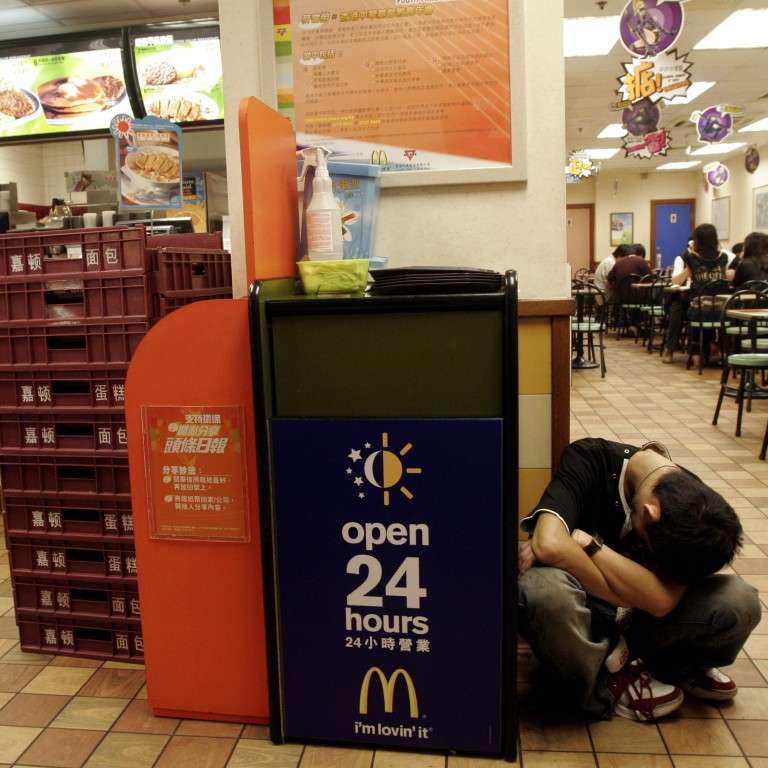
Hong's Kong's lack of affordable housing fuels 'McSleeper' trend, where the homeless sleep at McDonald's
'McSleepers' becoming alarming trend due to government inaction, social worker says
McDonald's - the culinary refuge for hungry Hongkongers who don't have time to think about food - is turning into the shelter of choice for the city's homeless.
The visited 20 of the 123 24-hour McDonald's in the city and found people who have come to be known as McRefugees or McSleepers in 17 restaurants.
READ MORE: The lonely life of the McSleepers, the poor who call McDonald's home
The phenomenon of the fast-food refugees was highlighted by the tragedy of a middle-aged woman who sat slumped at a table for hours before anyone noticed she was dead.
While there is no formal data, veteran social worker Ng Wai-tung of the Society for Community Organisation (Soco) described McDonald's as the "new street for the street sleepers", saying it was an alarming trend.
"With the number of 24-hour McDonald's growing, we've also seen an increasing amount in these places since we first spotted such McRefugees 16 years ago … yes, it's worrisome, especially when the government doesn't seem to face the problem."
The 's checks across 20 24-hour McDonald's in mostly city-centre locations counted 106 people spending at least parts of their night sleeping in them.
The Market Street McDonald's in Tsuen Wan had the most, with 15 people sleeping inside at 3.30am, when the visited, with an employee at the branch saying it had an average of 10 regular sleepers.
"I have been working in this branch for five years; there were no sleepers for the first two years. Then in the recent three, there were suddenly many," the employee said.
READ MORE: Save our McRefugees: Woman’s lonely unnoticed death in Hong Kong McDonald’s highlights need to help homeless
Most of the identified McSleepers are aged around 40 to 65. Compared with those on the streets, there were more women as well. There were 26 women among the 106 sleepers.
"It is ultimately a housing issue - there is literally no supply of single-person public housing available, while redevelopment of old areas where a lot of the bed spaces and subdivided rooms are located means less supply," Ng said. "Ultimately the government has to take responsibility, which they haven't."
Ng also criticised the government's reluctance in counting those sleeping in McDonald's as "street sleepers", saying they do have a roof over their heads.
According to the Social Welfare Department there were 882 street sleepers at the end of September, but Ng said the figures were routinely underestimated.
A department spokeswoman said it provided five short-term hostels and two emergency shelters with a total of 202 accommodation places.
Wendy Lam, McDonald's Hong Kong's senior director of corporate affairs, said: "McDonald's Hong Kong is accommodating to people [who] stay long in the restaurant for their own respective reasons, while we also strike a good balance to ensure that we continue to offer all customers an enjoyable dining experience."
